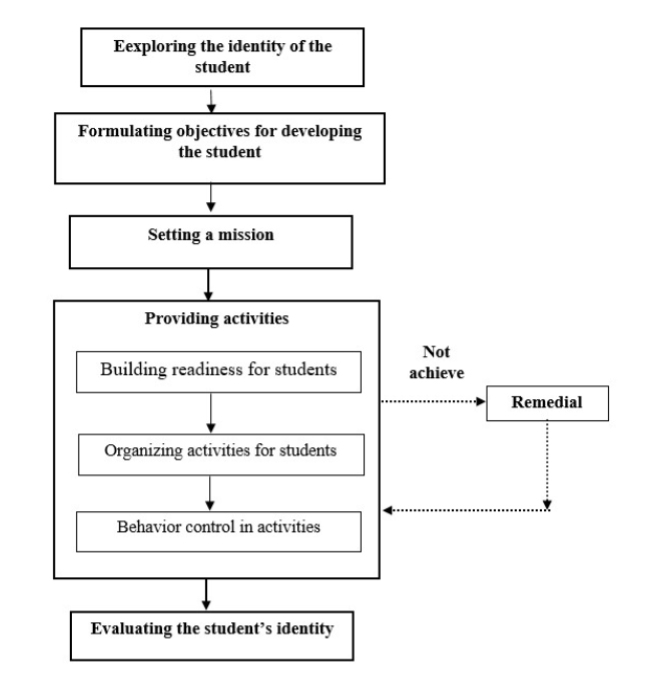The process of teaching and learning to create students’ identity
Main Article Content
Abstract
The purpose of the study was to empirically validate the teaching and learning process to create students' identity. Twenty-six Agricultural Education students and a lecturer in the Economics of Vegetables subjects completed three activities by applying five steps in enhancing the identity of Phonpakdee and Aquino: 1) exploring the identity of the student; 2) formulating objectives for developing the student; 3) setting a mission; 4) providing activities; and 5) evaluating the students' identity. The results showed that the number of students who had low perseverance decreased in all three domains. The number of students with low honesty in terms of affective and psychomotor decreased while cognitive domain remained the same. The number of students with low intuitiveness in the psychomotor was reduced but the cognitive and affective still did not change.
Article Details

This work is licensed under a Creative Commons Attribution-NonCommercial-NoDerivatives 4.0 International License.
References
P. Leeprecha, Creating and inheriting identity of ethnic Hmong: In the identity discourse, Bangkok, O.S. Printing House, 2004.
R. Phonpakdee, Appropriate personality of teaching profession among industrial education students of King Mongkut’s Institute of Technology Ladkrabang, Procedia-Social and Behavioral Sciences, 127(2014) 427-431.
S. Intorrathed, P. Poungsuk, P. Junlek, KMITL Identity/Interviewer: R. Phonpakdee, Activities Design for Identity Construction of Industrial Education Students in King Mongkut’s Institute of Technology Ladkrabang, Bangkok, Thailand. 2013.
R. Gross, Psychology the science of mind and behavior, Abington, Bookpoint Ltd., 2010.
B. S. Bloom, M. D. Engelhart, E. J. Furst, W. H. Hill, D. R. Krathwonhl, Taxonomy of educational objectives: The classification of educational goals, New York: David McKay Company. 1956.
A. W. Chickering, L. Reisser, Education and identity, 2nd ed., San Francisco, Josey-Bass; 1993.
U. Popattanacha, S. Phetriang, Development of Nursing Student Identity in Boromarajonani College of Nursing, Suratthani Nursing Journal of the Ministry of Public Health, 25(2)(2015)103-115.
S. Kemmis, R. McTaggart, The Action Research Reader, Third edition, Deakin University Press, Victoria, 1988.
T. Intachod, Study identification, and development of student identities Kasetsart University, Bangkhen, Dhurakij Pundit University. 2018.
P. Kerdpitak, Set of Series on Theories and Guideline for Counseling, Bangkok, Sukhothaitammatirat University, 2002.
S. T. J.Powell, A systematic Review of How Theories Explain Learning Behavior in School Context in Research Evidence in Education Library, London, EPPI-Centre, Social Science Research Unit, Institute of Education, University of London, 2004.
K. Saipon, A Study of Identity Status of Late Adolescence in Higher Education Institutes. (Master of Arts in Developmental Psychology), Chulalongkorn University, Bangkok, Thailand, Available from: http://www.thaithesis.org/detail.php?id=1082536000433
T. Lickona, Educating for Character: How our school can teach, respect, and be responsible. New York, Bantam Books,1991.
R. Phonpakdee, M. Aquino, Design Innovations in Identity Enhancement of Industrial Education Students of the King Mongkut’s Institute of Technology Ladkrabang in Thailand. Romanian Journal of Experimental Applied Psychology, 7(2016) 48-51.
S. Boag Ego, drives, and the dynamics of internal objects, Front Psycho 2014(5) 666 DOI: 10.3389/fpsyg.2014.00666
J. Piaget, The Moral Judgement of the Child, London, Routledge & Kegan Paul, 1932.
J. A. Boydston, , Guide to the Works of John Dewey. Edwardsville, IL: Southern Illinois, University Press. 1972.
N. Mazar, O. Amir, D. Ariely, The Dishonesty of Honest People:
A Theory of Self-concept Maintenance, Journal of marketing research 45(6)(2008) 633-644.
L. Kohlberg, Stage and sequence “Handbook of socialization theory and research”, New York, McGraw-Hill, 1969.
T. Khammani, Teaching Science “Knowledge for Effective Learning Process”, Bangkok, Chulalongkorn University Press, 2009.
F. Wongleka, Honesty Awareness to accelerate the implantation of Thai children, Available from: https://minthanissara.wordpress.com
NIDAPoll, The moral of the Thai youth in the future, Available from: http://nidapoll.nida.ac.th/index.php?op=polls-index.
U. Pengsatit, Learning: Psychology, Bangkok: Kingjan Printing, 1987.


